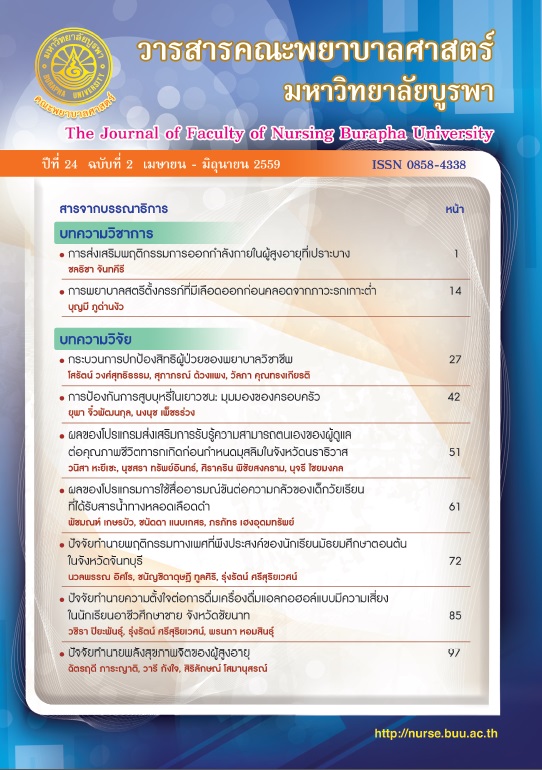คำสำคัญ:
การรับรู้ความสามารถตนเอง, คุณภาพชีวิต, ทารกเกิดก่อนกำหนดมุสลิม, จังหวัดนราธิวาส, Perceived self-efficacy, Quality of Life, Muslim preterm infants, Naradhiwas provinceบทคัดย่อ
การวิจัยกึ่งทดลองแบบสองกลุ่มวัดผลก่อนและหลัง
การทดลอง มีวัตถุประสงค์เพื่อศึกษาผลของโปรแกรม
ส่งเสริมการรับรู้ความสามารถตนเองของผู้ดูแลต่อคุณภาพ
ชีวิตทารกเกิดก่อนกำหนดมุสลิมในจังหวัดนราธิวาส กลุ่ม
ตัวอย่างคือผู้ดูแลและทารกเกิดก่อนกำหนดมุสลิมอายุ
1-12 เดือน ที่จำหน่ายออกจากโรงพยาบาลนราธิวาส
ราชนครินทร์ จำนวน 32 คู่ สุ่มเข้ากลุ่มทดลองและกลุ่ม
ควบคุม กลุ่มละ 16 คู่ กลุ่มควบคุมได้รับการพยาบาลตาม
ปกติของหน่วยงานที่ติดตามมารดาและทารกหลังคลอด
กลุ่มทดลองได้รับการพยาบาลตามปกติร่วมกับให้โปรแกรม
การทดลอง เครื่องมือที่ใช้ในการวิจัย ได้แก่ แบบสอบถาม
ข้อมูลส่วนบุคคล และแบบสอบถามคุณภาพชีวิตทารก
เกิดก่อนกำหนดมุสลิมโดยมีค่าความเชื่อมั่น เท่ากับ .88
วิเคราะห์ข้อมูลโดยการแจกแจงความถี่ ร้อยละ ค่าเฉลี่ย
ส่วนเบี่ยงเบนมาตรฐาน และการทดสอบที
ผลการวิจัยพบว่า ภายหลังการทดลอง ทารกเกิด
ก่อนกำหนดมุสลิมในกลุ่มทดลองมีคะแนนเฉลี่ยคุณภาพ
ชีวิตเพิ่มขึ้นมากกว่า กลุ่มควบคุม มีนัยสำคัญทางสถิติ
(t = 26.468, p < .001) และคะแนนเฉลี่ยคุณภาพชีวิต
ภายในกลุ่มทดลองหลังการทดลองสูงกว่าก่อนการทดลอง
อย่างมีนัยสไคัญทางสถิติ (t = 23.973, p < .001) ผลการ
วิจัยนี้มีข้อเสนอแนะว่าพยาบาลที่รับผิดชอบดูแลสุขภาพ
มารดาและทารกสามารถนไโปรแกรมส่งเสริมความ
สามารถตนเองของผู้ดูแลนี้ไปใช้ได้อย่างมีประสิทธิภาพเพื่อ
ให้ทารกมีคุณภาพชีวิตดีขึ้น
-------------------------------------------------
This quasi-experimental two-group
pretest-posttest research aimed to examine
effects of the perceived self-efficacy promotion
program of caregivers on quality of life of Muslim
preterm infants in Naradhiwas province. Sample
included 32 dyads of Muslim caregivers and their
1-12 month preterm infants, who were discharged
from the Naradthiwas hospital, was recruited and
later randomly assigned to the control and the
intervention for 16 dyads of each group. The
control group received usual care as schedule of
maternal and child postpartum follow-up unit.
The intervention group received the usual care
plus the intervention program. Research
instruments consisted of a demographic
questionnaire, and the Quality of Life (QoL) of
preterm infant questionnaire. Cronbach’s alpha
reliability was .88. Data were analyzed by using
frequency, percent, mean, standard deviation and
t-test.
Results revealed that after the intervention,
Muslim preterm infants in the experimental group
had their QoL better than those in the control
group (t = 26.468, p < .001). Mean score of QoL
within the experimental group, after receiving the
intervention, was significantly higher than before
the intervention (t = 23.973, p < .001). These
findings suggest that nurses who responsible for
the care of mothers’ and infants’ health could
obtain this perceived self-efficacy promotion
program of caregivers to effectively administration
resulting in better infant’s QoL.





